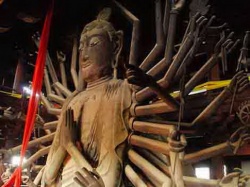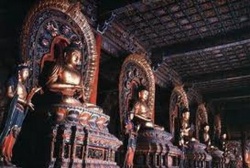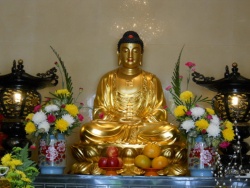Difference between revisions of "Lifelong Story of the Living Buddha"
(Created page with "thumb|250px| The Living Buddha Chazhub Ngawang Lobsang was born in 1880 (the Tibetan Year of Iron Dragon) in the noble family of Deleg Raodainba in Xigaze. ...") |
|||
| (13 intermediate revisions by 4 users not shown) | |||
| Line 1: | Line 1: | ||
[[File:C6bc5.jpg|thumb|250px|]] | [[File:C6bc5.jpg|thumb|250px|]] | ||
| − | The Living Buddha Chazhub Ngawang Lobsang was born in 1880 (the Tibetan Year of Iron Dragon) in the | + | The [[Living Buddha]] [[Chazhub Ngawang Lobsang]] was born in 1880 (the [[Tibetan]] [[Year of Iron Dragon]]) in the [[Noble]] family of [[Deleg Raodainba]] in Xigaze. He [[died]] in 1957 as the deputy editor-in-chief of [[Tibet]] Daily in 1957. |
| − | Chazhub Ngawang Lobsang was tonsured to the Sera Monastery in 1885, at the age of five. Before long, he was determined as the reincarnated soul boy of the Living Buddha Gandain Chiba Lobsang Geleg. The enthronement ceremony was held in 1886 in the | + | [[Chazhub Ngawang Lobsang]] was tonsured to the [[Sera Monastery]] in 1885, at the age of five. Before long, he was determined as the [[reincarnated]] [[soul]] boy of the [[Living Buddha]] [[Gandain Chiba Lobsang Geleg]]. The enthronement {{Wiki|ceremony}} was held in 1886 in the [[Monastery]] for him to become the [[Living Buddha]] [[Chazhub Ngawang Lobsang]]. |
| − | The Living Buddha Chazhub Ngawang Lobsang was very intelligent and studied very hard. He won the highest Buddhist academic degree of Lharanba Geshi when he was 21 years old. After this, he travelled around | + | The [[Living Buddha]] [[Chazhub Ngawang Lobsang]] was very {{Wiki|intelligent}} and studied very hard. He won the [[highest]] [[Buddhist]] {{Wiki|academic}} {{Wiki|degree}} of [[Lharanba Geshi]] when he was 21 years old. After this, he travelled around In [[Tibet]], seeking further study of {{Wiki|history}}, {{Wiki|literature}}, poems, [[Tibetan Medicine]] and {{Wiki|astronomy}}. He was well versed in {{Wiki|literature}}, poems and [[Tibetan grammar]]. |
| − | The Living Buddha Chazhub Ngawang Lobsang once accompanied the 13th Dalai Lama to visit Beijing, where they were received by Qing Dynasty (1644-1911) Emperor Guangxu. Upon return to Tibet, the 13th Dalai Lama sent him to Japan. Later, he served as the | + | The [[Living Buddha]] [[Chazhub Ngawang Lobsang]] once accompanied the [[13th Dalai Lama]] to visit {{Wiki|Beijing}}, where they were received by {{Wiki|Qing Dynasty}} (1644-1911) [[Emperor]] Guangxu. Upon return to [[Tibet]], the [[13th Dalai Lama]] sent him to [[Japan]]. Later, he served as the [[Sutra]] [[Teacher]] for the [[14th Dalai Lama]], and joined hands with [[Geshi Xerab Gyamco]] to collate [[Tripitaka]]. |
| − | At the end of 1951, when the PLA troops were stationed in Lhasa, the Living Buddha Chazhub Ngawang Lobsang, excited at the change, assisted the PLA in social work. At the beginning, the 71-year-old Living Buddha served as the vice-president of the Party School for Cadres of the PLA Tibet Military Area. He compiled teaching materials and taught in person. | + | At the end of 1951, when the PLA troops were stationed in {{Wiki|Lhasa}}, the Living [[Buddha]] [[Chazhub Ngawang Lobsang]], excited at the change, assisted the PLA in {{Wiki|social}} work. At the beginning, the 71-year-old [[Living Buddha]] served as the vice-president of the Party School for Cadres of the PLA [[Tibet]] {{Wiki|Military}} Area. He compiled [[teaching]] materials and taught in [[person]]. |
| − | In 1952, when the Compilation and Examination Committee of the PLA Tibet Military Area was founded, the Living Buddha Chazhub Ngawang Lobsang, then 72 years old, served as an executive committee member. He worked for the publication of the Tibetan News Release. | + | In 1952, when the Compilation and Examination Committee of the PLA [[Tibet]] {{Wiki|Military}} Area was founded, the [[Living Buddha]] [[Chazhub Ngawang Lobsang]], then 72 years old, served as an executive committee member. He worked for the publication of the [[Tibetan]] News Release. |
[[File:Datong-Huaya.jpeg|thumb|250px|]] | [[File:Datong-Huaya.jpeg|thumb|250px|]] | ||
| − | At that | + | At that [[Time]], a small number of [[people]] on the upper echelon of the ruling class [[In Tibet]] were working hand in glove with pro-imperialists to undermine the implementation of the Agreement Between the Central Government and the Local Government of [[Tibet]] for Methods on the [[Peaceful]] [[Liberation]] of [[Tibet]], known as the 17-Article Agreement. The Living [[Buddha]] [[Chazhub Ngawang Lobsang]] stood firmly by the Central Government, working hard to defend the unification of the motherland. Joining hands with some other major [[scholars]] [[In Tibet]], he translated many materials from {{Wiki|Chinese}} to [[Tibet]], and vice versa. As not many [[Books]] on [[Tibetan]] {{Wiki|terminology}} and [[Tibetan grammar]] were available at that [[Time]], the [[Living Buddha]] [[Chazhub Ngawang Lobsang]] worked out a [[book]] titled [[Tibetan]] [[Grammar]] by Chazhub. |
| − | During that period of | + | During that period of [[Time]], the [[Living Buddha]] [[Chazhub Ngawang Lobsang]] served also as a member of the [[Tibet]] Patriotic Youths Federation, Board Chairman and Vice-President of the {{Wiki|Lhasa}} Serxing [[Primary]] School, and [[Tibetan]] [[Language]] lecturer with the Party School for Cadres of the PLA [[Tibet]] {{Wiki|Military}} Area. In 1956, the year before his [[Death]], he took up the post as a [[Tibetan Language]] [[Teacher]] for the Journalism Training Program of the [[Tibet]] Daily. He worked very hard. When advised to take it easy, he said: “Yes, I am old now. Now, with the presence of the CPC and the Central Government led by Chairman [[Mao Zedong]], I don’t [[feel]] too tired. I think I am young.” |
| − | The Living Buddha Chazhub Ngawang Lobsang said at the first anniversary of the founding of the Tibet Daily: | + | The [[Living Buddha]] [[Chazhub Ngawang Lobsang]] said at the first anniversary of the founding of the [[Tibet]] Daily: “[[Chairman Mao]] and the CPC are great. Had it not been for them, [[Tibet]] would not be peacefully {{Wiki|liberated}}, and the {{Wiki|Tibetan people}} would not be able to get rid of the yoke of imperialism and enjoy equality in the big {{Wiki|Chinese}} family. ‘’ |
| − | In the seven years of his working for the Tibetan News Release (predecessor of the Tibet Daily), the paper suffered from strong objection from some lamas with the three major | + | In the seven years of his working for the [[Tibetan]] News Release (predecessor of the [[Tibet]] Daily), the paper [[suffered]] from strong objection from some [[lamas]] with the three major [[Monasteries]] in {{Wiki|Lhasa}} (referring to the [[Zhaibung]], [[Sera]] and [[Gandain]] [[Monasteries]]). Out of his [[Love]] for [[Tibet]] and for the motherland at large, the [[Living Buddha]] [[Chazhub Ngawang Lobsang]] persisted in delivering the paper to the three [[Monasteries]] and explained in great detail the policies of the CPC and the Central Government to [[lamas]] there. When he became the deputy editor-in-chief of the [[Tibet]] Daily, he did this until his [[Death]]. |
| − | In 1954, the Qinghai-Tibet and the Sichuan-Tibet Highways were open to traffic. Elated as he was, the Living Buddha Chazhub Ngawang Lobsang wrote a poem titled Jade Belts and Golden Bridge, which was loved by the Tibetans. The poem read in part: | + | In 1954, the {{Wiki|Qinghai}}-[[Tibet]] and the {{Wiki|Sichuan}}-[[Tibet Highways]] were open to traffic. [[Elated]] as he was, the [[Living Buddha]] [[Chazhub Ngawang Lobsang]] wrote a poem titled Jade Belts and Golden Bridge, which was loved by the [[Tibetans]]. The poem read in part: |
| − | “High mountains piercing into the sky like heavenly pillars, | + | “High mountains piercing into the sky like [[heavenly]] pillars, |
| − | Gallop thousands of miles like surging waves of the ocean; | + | Gallop thousands of {{Wiki|miles}} like surging waves of the ocean; |
| − | Deep ravines and rapids cut off | + | Deep ravines and rapids cut off [[Tibet]]’s connection |
| − | with neighboring provinces of Qinghai and Xikang, | + | with neighboring provinces of {{Wiki|Qinghai}} and Xikang, |
With upturned cliffs which are sharp and steep. | With upturned cliffs which are sharp and steep. | ||
| Line 34: | Line 34: | ||
To cross these ravines and piercing peaks, | To cross these ravines and piercing peaks, | ||
| − | Even holy eagles have worries. | + | Even {{Wiki|holy}} eagles have worries. |
| − | To build a road which links Tibet with the outside | + | To build a road which links [[Tibet]] with the outside [[World]], |
| − | Heroic builders brave fierce wind and high rains, | + | Heroic builders brave fierce [[wind]] and high rains, |
| − | Drink lukewarm water and eat half done | + | Drink lukewarm [[water]] and eat half done [[Food]].” |
[[File:DSCN0161.JPG|thumb|250px|]] | [[File:DSCN0161.JPG|thumb|250px|]] | ||
| − | On September 30, 1957, it drizzled in Lhasa. Editors with the Tibet Daily had begun working in the morning, but they could not find their deputy editor-in-chief. Where was the Living Buddha Chazhub Ngawang Lobsang? | + | On September 30, 1957, it drizzled in {{Wiki|Lhasa}}. Editors with the [[Tibet]] Daily had begun working in the morning, but they could not find their deputy editor-in-chief. Where was the [[Living Buddha]] [[Chazhub Ngawang Lobsang]]? |
| − | At the | + | At the [[Time]] when the paper leaders were making arrangement for young [[Staff]] to find the old man, they received a report that the Living [[Buddha]] Chazhub [[Ngawang Lobsang]] was attacked by a mad [[Lama]]. They rushed to the spot and sent the old man to the {{Wiki|Lhasa}} People’s Hospital. |
| − | The Living Buddha Chazhub Ngawang Lobsang didn’t recover, and demised at 1:59 pm on December 1. | + | The [[Living Buddha]] [[Chazhub Ngawang Lobsang]] didn’t recover, and demised at 1:59 pm on December 1. |
| − | Just a few days before his | + | Just a few days before his [[Death]], the Living [[Buddha]] Chazhub [[Ngawang Lobsang]] told visiting leaders with the [[Tibet]] Work Committee of the Central Government: “My lifelong [[experience]] told me that only by following the [[Leadership]] of the CPC and Chairman Mao, only upholding unity, patriotism and progress, and only opposing separatism, can [[Tibet]] have a bright future.” |
[[Category:Buddhist Terms]] | [[Category:Buddhist Terms]] | ||
[[Category:Tibetan Buddhism]] | [[Category:Tibetan Buddhism]] | ||
[[Category:Tibetan Buddhist monasteries]] | [[Category:Tibetan Buddhist monasteries]] | ||
[[Category:Tibetan Buddhist Teachers]] | [[Category:Tibetan Buddhist Teachers]] | ||
| + | [[Category:Mahayana Monasteries]] | ||
Latest revision as of 18:42, 30 October 2013
The Living Buddha Chazhub Ngawang Lobsang was born in 1880 (the Tibetan Year of Iron Dragon) in the Noble family of Deleg Raodainba in Xigaze. He died in 1957 as the deputy editor-in-chief of Tibet Daily in 1957.
Chazhub Ngawang Lobsang was tonsured to the Sera Monastery in 1885, at the age of five. Before long, he was determined as the reincarnated soul boy of the Living Buddha Gandain Chiba Lobsang Geleg. The enthronement ceremony was held in 1886 in the Monastery for him to become the Living Buddha Chazhub Ngawang Lobsang.
The Living Buddha Chazhub Ngawang Lobsang was very intelligent and studied very hard. He won the highest Buddhist academic degree of Lharanba Geshi when he was 21 years old. After this, he travelled around In Tibet, seeking further study of history, literature, poems, Tibetan Medicine and astronomy. He was well versed in literature, poems and Tibetan grammar.
The Living Buddha Chazhub Ngawang Lobsang once accompanied the 13th Dalai Lama to visit Beijing, where they were received by Qing Dynasty (1644-1911) Emperor Guangxu. Upon return to Tibet, the 13th Dalai Lama sent him to Japan. Later, he served as the Sutra Teacher for the 14th Dalai Lama, and joined hands with Geshi Xerab Gyamco to collate Tripitaka.
At the end of 1951, when the PLA troops were stationed in Lhasa, the Living Buddha Chazhub Ngawang Lobsang, excited at the change, assisted the PLA in social work. At the beginning, the 71-year-old Living Buddha served as the vice-president of the Party School for Cadres of the PLA Tibet Military Area. He compiled teaching materials and taught in person.
In 1952, when the Compilation and Examination Committee of the PLA Tibet Military Area was founded, the Living Buddha Chazhub Ngawang Lobsang, then 72 years old, served as an executive committee member. He worked for the publication of the Tibetan News Release.
At that Time, a small number of people on the upper echelon of the ruling class In Tibet were working hand in glove with pro-imperialists to undermine the implementation of the Agreement Between the Central Government and the Local Government of Tibet for Methods on the Peaceful Liberation of Tibet, known as the 17-Article Agreement. The Living Buddha Chazhub Ngawang Lobsang stood firmly by the Central Government, working hard to defend the unification of the motherland. Joining hands with some other major scholars In Tibet, he translated many materials from Chinese to Tibet, and vice versa. As not many Books on Tibetan terminology and Tibetan grammar were available at that Time, the Living Buddha Chazhub Ngawang Lobsang worked out a book titled Tibetan Grammar by Chazhub.
During that period of Time, the Living Buddha Chazhub Ngawang Lobsang served also as a member of the Tibet Patriotic Youths Federation, Board Chairman and Vice-President of the Lhasa Serxing Primary School, and Tibetan Language lecturer with the Party School for Cadres of the PLA Tibet Military Area. In 1956, the year before his Death, he took up the post as a Tibetan Language Teacher for the Journalism Training Program of the Tibet Daily. He worked very hard. When advised to take it easy, he said: “Yes, I am old now. Now, with the presence of the CPC and the Central Government led by Chairman Mao Zedong, I don’t feel too tired. I think I am young.”
The Living Buddha Chazhub Ngawang Lobsang said at the first anniversary of the founding of the Tibet Daily: “Chairman Mao and the CPC are great. Had it not been for them, Tibet would not be peacefully liberated, and the Tibetan people would not be able to get rid of the yoke of imperialism and enjoy equality in the big Chinese family. ‘’
In the seven years of his working for the Tibetan News Release (predecessor of the Tibet Daily), the paper suffered from strong objection from some lamas with the three major Monasteries in Lhasa (referring to the Zhaibung, Sera and Gandain Monasteries). Out of his Love for Tibet and for the motherland at large, the Living Buddha Chazhub Ngawang Lobsang persisted in delivering the paper to the three Monasteries and explained in great detail the policies of the CPC and the Central Government to lamas there. When he became the deputy editor-in-chief of the Tibet Daily, he did this until his Death.
In 1954, the Qinghai-Tibet and the Sichuan-Tibet Highways were open to traffic. Elated as he was, the Living Buddha Chazhub Ngawang Lobsang wrote a poem titled Jade Belts and Golden Bridge, which was loved by the Tibetans. The poem read in part:
“High mountains piercing into the sky like heavenly pillars,
Gallop thousands of miles like surging waves of the ocean;
Deep ravines and rapids cut off Tibet’s connection
with neighboring provinces of Qinghai and Xikang,
With upturned cliffs which are sharp and steep.
To cross these ravines and piercing peaks,
Even holy eagles have worries.
To build a road which links Tibet with the outside World,
Heroic builders brave fierce wind and high rains,
Drink lukewarm water and eat half done Food.”
On September 30, 1957, it drizzled in Lhasa. Editors with the Tibet Daily had begun working in the morning, but they could not find their deputy editor-in-chief. Where was the Living Buddha Chazhub Ngawang Lobsang?
At the Time when the paper leaders were making arrangement for young Staff to find the old man, they received a report that the Living Buddha Chazhub Ngawang Lobsang was attacked by a mad Lama. They rushed to the spot and sent the old man to the Lhasa People’s Hospital.
The Living Buddha Chazhub Ngawang Lobsang didn’t recover, and demised at 1:59 pm on December 1.
Just a few days before his Death, the Living Buddha Chazhub Ngawang Lobsang told visiting leaders with the Tibet Work Committee of the Central Government: “My lifelong experience told me that only by following the Leadership of the CPC and Chairman Mao, only upholding unity, patriotism and progress, and only opposing separatism, can Tibet have a bright future.”


